Xiangning Yu
Causal Sufficiency and Necessity Improves Chain-of-Thought Reasoning
Jun 11, 2025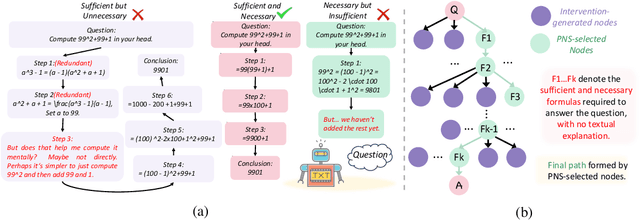
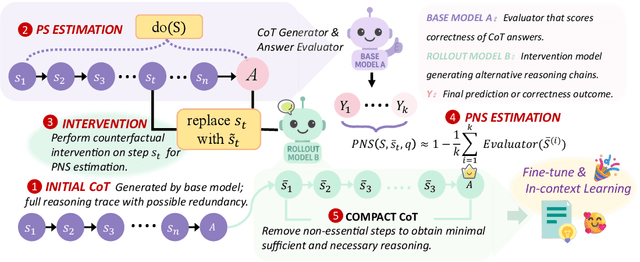
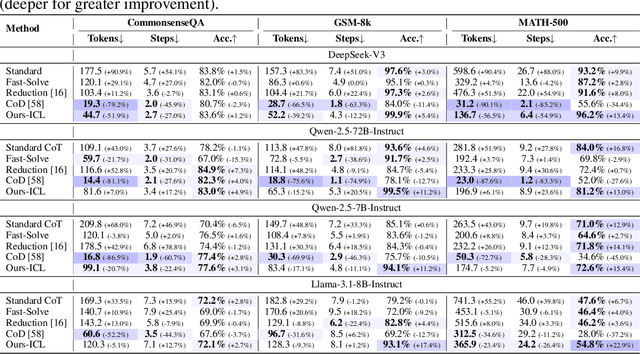
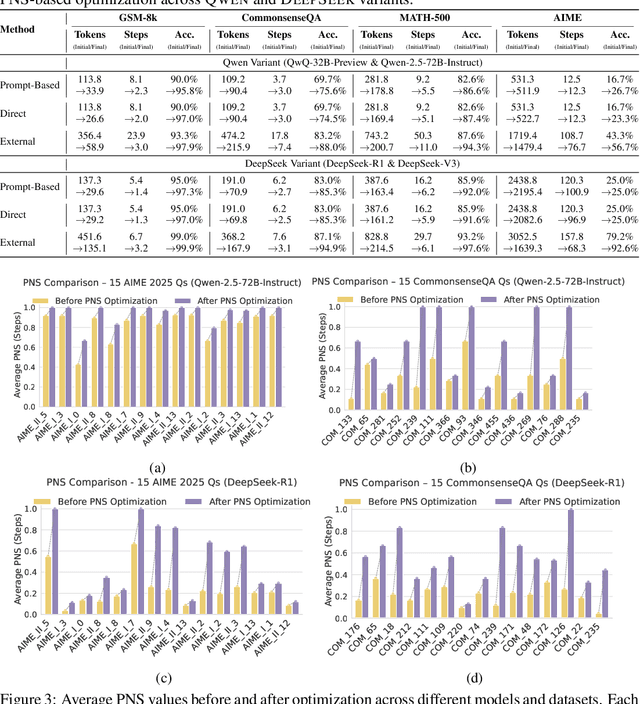
Abstract:Chain-of-Thought (CoT) prompting plays an indispensable role in endowing large language models (LLMs) with complex reasoning capabilities. However, CoT currently faces two fundamental challenges: (1) Sufficiency, which ensures that the generated intermediate inference steps comprehensively cover and substantiate the final conclusion; and (2) Necessity, which identifies the inference steps that are truly indispensable for the soundness of the resulting answer. We propose a causal framework that characterizes CoT reasoning through the dual lenses of sufficiency and necessity. Incorporating causal Probability of Sufficiency and Necessity allows us not only to determine which steps are logically sufficient or necessary to the prediction outcome, but also to quantify their actual influence on the final reasoning outcome under different intervention scenarios, thereby enabling the automated addition of missing steps and the pruning of redundant ones. Extensive experimental results on various mathematical and commonsense reasoning benchmarks confirm substantial improvements in reasoning efficiency and reduced token usage without sacrificing accuracy. Our work provides a promising direction for improving LLM reasoning performance and cost-effectiveness.
MF-LLM: Simulating Collective Decision Dynamics via a Mean-Field Large Language Model Framework
Apr 30, 2025
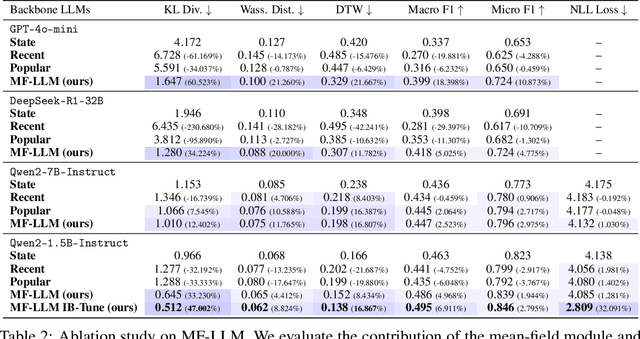


Abstract:Simulating collective decision-making involves more than aggregating individual behaviors; it arises from dynamic interactions among individuals. While large language models (LLMs) show promise for social simulation, existing approaches often exhibit deviations from real-world data. To address this gap, we propose the Mean-Field LLM (MF-LLM) framework, which explicitly models the feedback loop between micro-level decisions and macro-level population. MF-LLM alternates between two models: a policy model that generates individual actions based on personal states and group-level information, and a mean field model that updates the population distribution from the latest individual decisions. Together, they produce rollouts that simulate the evolving trajectories of collective decision-making. To better match real-world data, we introduce IB-Tune, a fine-tuning method for LLMs grounded in the information bottleneck principle, which maximizes the relevance of population distributions to future actions while minimizing redundancy with historical data. We evaluate MF-LLM on a real-world social dataset, where it reduces KL divergence to human population distributions by 47 percent over non-mean-field baselines, and enables accurate trend forecasting and intervention planning. It generalizes across seven domains and four LLM backbones, providing a scalable foundation for high-fidelity social simulation.
Computational Experiments Meet Large Language Model Based Agents: A Survey and Perspective
Feb 01, 2024



Abstract:Computational experiments have emerged as a valuable method for studying complex systems, involving the algorithmization of counterfactuals. However, accurately representing real social systems in Agent-based Modeling (ABM) is challenging due to the diverse and intricate characteristics of humans, including bounded rationality and heterogeneity. To address this limitation, the integration of Large Language Models (LLMs) has been proposed, enabling agents to possess anthropomorphic abilities such as complex reasoning and autonomous learning. These agents, known as LLM-based Agent, offer the potential to enhance the anthropomorphism lacking in ABM. Nonetheless, the absence of explicit explainability in LLMs significantly hinders their application in the social sciences. Conversely, computational experiments excel in providing causal analysis of individual behaviors and complex phenomena. Thus, combining computational experiments with LLM-based Agent holds substantial research potential. This paper aims to present a comprehensive exploration of this fusion. Primarily, it outlines the historical development of agent structures and their evolution into artificial societies, emphasizing their importance in computational experiments. Then it elucidates the advantages that computational experiments and LLM-based Agents offer each other, considering the perspectives of LLM-based Agent for computational experiments and vice versa. Finally, this paper addresses the challenges and future trends in this research domain, offering guidance for subsequent related studies.
 Add to Chrome
Add to Chrome Add to Firefox
Add to Firefox Add to Edge
Add to Edge